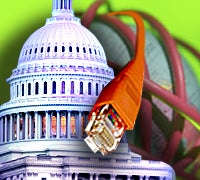 |
After receiving a precedent-setting rebuke from the Federal Communications Commission for its “discriminatory and arbitrary” network management practices, Comcast is now suing in an attempt to overturn the order.
The nation’s largest cable provider today filed an appeal with the U.S. Court of Appeals for the D.C. Circuit.
Comcast alleges that the FCC overstepped its authority by requiring the company to modify how it manages its network and submit a compliance plan to the commission.
“We filed this appeal in order to protect our legal rights and to challenge the basis on which the Commission found that Comcast violated federal policy in the absence of pre-existing legally enforceable standards or rules,” Comcast Executive Vice President David Cohen said in a statement.
The Comcast case has become a pivot point in the debate over network neutrality, the principle that all Internet traffic should be treated equally. Proponents such as the media-reform groups Free Press and Public Knowledge warn that ISPs, left to their own devices, could stifle innovation and competition on the Web by slowing the delivery of certain online services.
Critics charge that a disproportionate amount of Internet traffic comes from a small portion of heavy users running data-rich applications such as peer-to-peer file transfers.
In March, Comcast announced that it would move to a so-called “protocol-agnostic” method of managing traffic on its network, and last week unveiled a new policy where subscribers could see their service terminated if they exceed a monthly usage cap.
Comcast said that it intends to comply fully with the requirements of the FCC order, which stipulated that it must implement its traffic-management changes by the end of the year. The company also acknowledged that the commission has some authority over Internet service providers in “appropriate circumstances and in accordance with appropriate procedures,” Cohen said.
“However, we are compelled to appeal because we strongly believe that, in this particular case, the commission’s action was legally inappropriate and its findings were not justified by the record.”
[cob:Special_Report]The legal challenge was widely expected, but it wades into what Stifel Nicolaus analyst Blair Levin, a former FCC chief of staff, has described as a murky area of the law.
Levin has also noted that if the court were to strike down the FCC order, it could spur the next Congress to more aggressively pursue legislation that would give the commission a more formal authority on the matter.
Net neutrality legislation, the ultimate goal of groups such as Free Press, has appeared in Congress several times but has never come close to passing, consistently foundering on partisan lines.
Comcast is represented in its appeal by the Washington, D.C., firm Wiley Rein.


